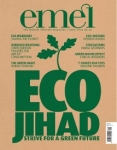
Resistance: the Essence of the Islamist Revolution by Alastair Crooke
Issue 57 June 2009
Resistance: the Essence of the Islamist Revolution by Alastair Crooke
Review by Usaama al-Azami
Resistance is a journey over several centuries, through the world views of Islamism and Western liberalism. It is an effort by the author to explain the world of Islamism and its intellectual foundations to a Western audience that is often unsympathetic, but must try and understand the ‘other’ if they are to constructively deal with the apparent ‘clash of civilisations’.
At the same time, it may be read as a critique of the modern Western social, political and economic thought. Crooke notes that, “Islamists see [the] de-humanising, individualising and controlling aspects of [the modern West’s] instrumental rationality as a loss of freedom—and the prime route by which the domination of others [both within the West and without] has been validated.” The book is divided into four parts: the first looks at how Muslims came to think that an Islamist resistance was necessary; Part II, by far the longest, traces the historical development and modern ideology of the Islamist resistance; Part III looks at how armed resistance is viewed in practice by Hamas and Hezbollah; and Part IV looks at the importance of language in the West versus Islamist conflict, and what the future has in store.
There is much that can be praised in this book—it is written for an educated layperson and is not intended as an academic work—so that the discussions that take place in the book may reach a wide audience, thereby facilitating a society-wide conversation on this issue. The work’s frequent references to important intellectuals and ideas, however, may be heavy going for some readers, although, with the advent of Wikipedia, I personally found the author’s namedropping to be an excellent learning opportunity.
A weakness in the work is that shi’a Islamist thought is given far more airtime than its sunni counterpart, despite sunnis’ making up about 85% of the world’s muslims. This isn’t necessarily a bad thing, however, as I certainly found it an educational read, and aside from that, for a Western readership, the Islamist revolution of Iran in 1979 was perhaps the most significant event of the last thirty years of Islamist ‘resistance’. The events of 11th September may have been of far greater importance in recent times, but as Crooke points out, the perpetrators of that horrendous crime are a fringe extremist minority that is completely disowned by mainstream Islamists like Hizbollah and Hamas, who were among the first to unequivocally condemn the attacks. In fact, the Al Qaedas of the world declare the mainstream Islamists Crooke is talking about to be heretics due to their promoting ideas like democracy. This mainstream is more important, in Crooke’s opinion, as it can claim a far greater grassroots following, and is in fact an intellectually coherent critique of Western thought.
Finally, I was a little irritated by the author’s idiosyncratic spelling of words like ‘Hesballah’, rather than the usual Hezbollah, among others. “The shi‘a” when treated as a group are somewhat curiously called “the shi’a” which is actually meant for a single shi’a individual. Ibn Taymiyya (literally: son of Taymiyya) is repeatedly referred to as “Taymiyya”, and his characterisation appears at times to be something of a caricature. Such errors cause one to question his knowledge of Arabic, without which it’s difficult to be authoritative about Islamic political, philosophical or theological thought.
All in all, this is a welcome addition to literature available on Islamism. The author’s style is decidedly cerebral, which is a refreshing change for writing on this topic. This book is the perfect antidote for the vacuous waxing of other, unfortunately more widely read, authors on Islamism. I can only hope that more people read this book and partake in the conversation it is attempting to start up here in the West.
Bookmark this |
|
Add to DIGG |
|
Add to del.icio.us |
|
Stumble this |
|
Share on Facebook |
|
Share this |
|
Send to a Friend |
|
Link to this |
|
Printer Friendly |
|
Print in plain text |
|


Comments
0 Comments